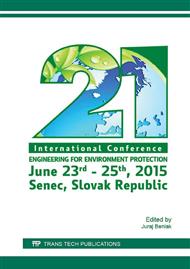p.69
p.79
p.89
p.95
p.103
p.109
p.115
p.122
p.131
Estimation and Measurement of Heat from Municipal Landfills
Abstract:
At present, deposition of garbage in landfills is one of the most popular methods to dispose of solid waste produced in municipal areas. In a landfill, large amounts of organic garbage is deposited, where certain types of bacteria flourish and decompose the garbage, whereby heat is produced as by-product. During the decades of operation, considerable quantities of heat are generated in these microbiologically active zones. In such zones, the temperature is typically about 40-60 °C. Knowing this quantities could obviously help planning an energy management system. In this respect, the objective is to extract as much heat from the landfill as possible, and utilize it for applications such as space heating, domestic hot water production, greenhouses, etc. The present paper aims to outline the methods of estimation of the amount of heat that is produced in a landfill during the decades of its operation. The methodology of measurement of thermal conditions and of the heat output capacity is presented, with an example of data, collected so far.
Info:
Periodical:
Pages:
103-108
DOI:
Citation:
Online since:
April 2016
Authors:
Keywords:
Price:
Сopyright:
© 2016 Trans Tech Publications Ltd. All Rights Reserved
Share:
Citation:


